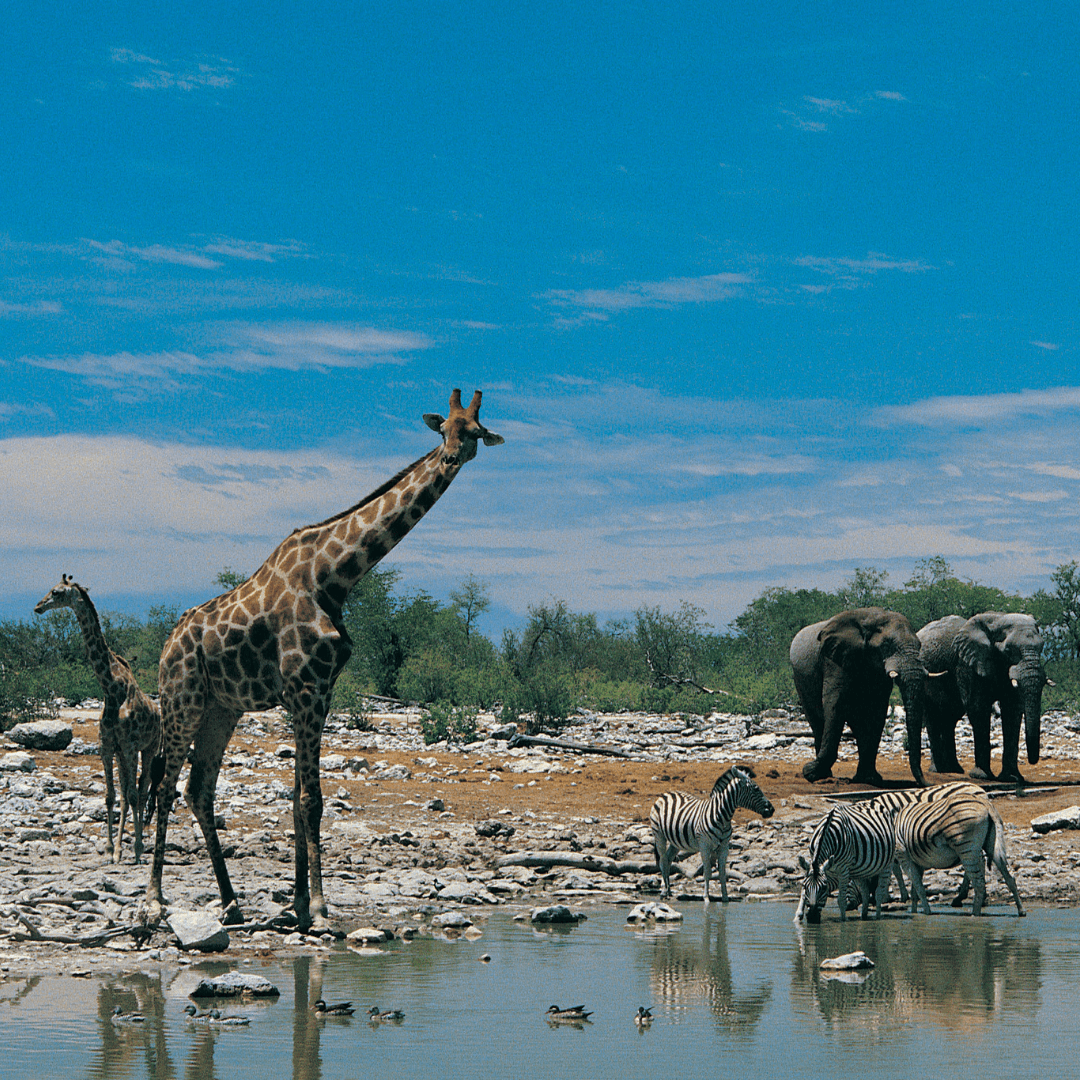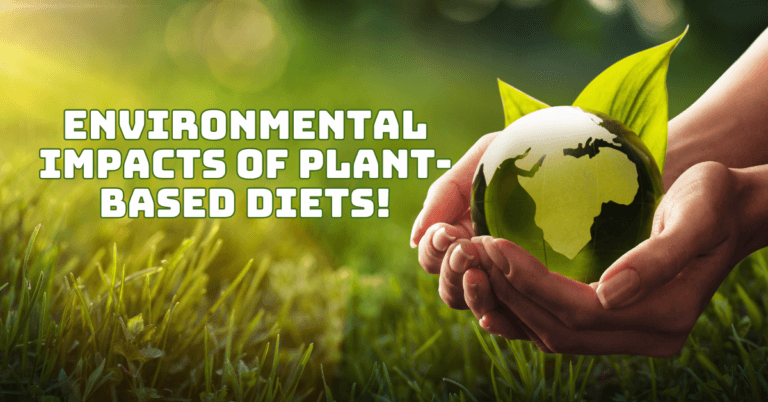Environmental Reasons To Go Vegan
Environmental Reasons To Go Vegan
In the face of escalating environmental crises, the decision to adopt a vegan lifestyle emerges as a compelling and impactful choice for conscientious individuals.
Our planet is grappling with the adverse effects of climate change, deforestation, and resource depletion, prompting a critical reevaluation of our dietary habits.
Going vegan isn't just a dietary preference but a powerful stance against environmental degradation.
The production of animal-based foods significantly contributes to deforestation, water pollution, and greenhouse gas emissions, amplifying the urgency for a sustainable shift.
This article will explore the undeniable environmental reasons to go vegan, unravelling the intricate relationship between our dietary choices and the imperative to foster a sustainable and harmonious coexistence with our fragile ecosystem.
This article will also delve into the profound environmental reasons compelling individuals to embrace a vegan lifestyle, shedding light on how this dietary shift can catalyze a more sustainable and harmonious coexistence between humanity and our fragile ecosystem.
Exploring The Environmental Reasons To Go Vegan
Living vegan is a deep commitment to environmental stewardship, not just a dietary decision.
The choice to adopt a vegan diet shows great promise in reducing the ecological impact of human activity as the environmental problems facing our planet worsen.
Here are the key environmental reasons compelling individuals to adopt a vegan lifestyle:

1. Reduced Greenhouse Gas Emissions
Animal agriculture significantly contributes to the global rise in greenhouse gas emissions, primarily by releasing methane and nitrous oxide.
Methane, produced during the digestive processes of ruminant animals like cows, is a potent greenhouse gas with a warming potential much higher than carbon dioxide over the short term.
Nitrous oxide, largely from manure management and fertilizer use in animal agriculture, has a longer atmospheric lifespan, impacting global warming.
The shift towards a plant-based diet is a pivotal strategy to address this environmental challenge. Vegan individuals directly reduce the demand for livestock farming by opting for plant-based alternatives.
This reduction curtails the number of methane-emitting animals and mitigates the need for extensive land use, deforestation, and the associated emissions.
Plant-based diets offer a more sustainable and efficient use of resources, requiring less land, water, and energy than traditional animal agriculture.

2. Deforestation And Land Use
The link between animal agriculture and deforestation is undeniable, as vast expanses of land are cleared to accommodate the growing demands of livestock farming.
This clearing often involves the destruction of dense, biodiverse forests, leading to significant biodiversity loss and habitat degradation.
The consequences extend beyond the immediate environmental impact, as deforestation disrupts delicate ecosystems, threatens numerous plant and animal species, and contributes to the ongoing global biodiversity crisis.
Shifting to plant-based diets is a crucial strategy to counteract this environmental degradation. Individuals reduce the demand for extensive land use associated with animal agriculture by opting for plant-based alternatives.
This transition promotes the conservation of forests, allowing ecosystems to regenerate and biodiversity to flourish.
Adopting a plant-based lifestyle addresses the deforestation crisis and represents a proactive choice in safeguarding the delicate balance of Earth's ecosystems.
It embodies a commitment to preserving biodiversity, acknowledging the intrinsic value of thriving, undisturbed natural habitats in the face of increasing threats posed by widespread deforestation.

3. Water Conservation
Adopting a vegan lifestyle is a paramount environmental reason to address water-related challenges for vegans, mitigating the dual threats of pollution and scarcity associated with the extensive water requirements of animal agriculture.
Livestock farming involves cultivating vast crops for animal feed, demanding substantial irrigation.
This process consumes significant volumes of freshwater and introduces pollutants, including pesticides, fertilizers, and animal waste, into water bodies through runoff.
Additionally, the water used for the animals contributes to the overall environmental strain.
Transitioning to a vegan lifestyle offers a tangible solution to these water-related challenges. Plant-based diets inherently demand less water, eliminating the need for large-scale irrigation for livestock feed.
Individuals can lower their water footprint by choosing a diet of fruits, vegetables, grains, and legumes. This reduction in water consumption aligns with principles of sustainable water use, fostering environmental resilience.
Embracing a vegan lifestyle becomes an impactful choice, promoting responsible water stewardship and preserving aquatic ecosystems, ultimately steering humanity towards a more sustainable coexistence with our planet.

4. Climate Change Mitigation
A vegan diet is pivotal in mitigating climate change by directly addressing the significant carbon footprint associated with animal agriculture.
Livestock farming generates substantial greenhouse gas emissions, particularly methane and nitrous oxide, contributing to global warming.
By opting for plant-based alternatives, individuals lower the demand for meat and dairy production, thereby reducing emissions tied to livestock.
Shifting to a vegan lifestyle promotes a more sustainable and efficient food system. It not only lessens the need for deforestation and land-use changes, which are major contributors to carbon emissions, but also curtails the environmental impact of feed production, transportation, and the energy-intensive processes inherent in animal farming.
Moreover, a plant-based diet encourages adopting regenerative and eco-friendly agricultural practices.

5. Economic Implications
The economic implications of transitioning to plant-based agriculture extend to improved public health outcomes, emphasizing environmental reasons to go vegan, as plant-centric diets are associated with lower rates of diet-related diseases, leading to reduced healthcare costs and long-term economic savings.
One notable advantage lies in reduced healthcare costs associated with consuming plant-based diets. Plant-centric eating patterns are linked to lower rates of diet-related diseases, including cardiovascular issues and certain cancers.
As individuals adopt healthier lifestyles, the burden on healthcare systems diminishes, resulting in long-term economic savings.
Moreover, transitioning away from animal agriculture entails resource savings. Plant-based farming generally requires less land, water, and energy, promoting efficiency in resource utilization.
This reduces the environmental strain and contributes to long-term economic sustainability.
Additionally, the plant-based industry presents opportunities for job creation and economic growth, with the burgeoning demand for alternative protein sources and plant-based products.
Plant-based foods' cultivation, processing, and distribution open avenues for innovation, fostering a sustainable economic ecosystem that aligns with evolving consumer preferences and global efforts toward a more resilient and ethically conscious economy.

6. Ocean Conservation
Industrial fishing and aquaculture threaten ocean ecosystems, depleting marine resources and disrupting the delicate balance.
Overfishing not only diminishes fish populations but also disrupts entire aquatic ecosystems, jeopardizing the intricate web of marine life.
These practices often involve destructive methods like trawling, causing habitat destruction and impacting non-target species.
Embracing a vegan diet emerges as a powerful solution to alleviate the pressures on marine environments.
Individuals directly reduce the demand for overexploited and often unsustainable fishing practices by abstaining from seafood consumption.
This choice contributes to preserving marine biodiversity, allowing fish populations to recover and ecosystems to restore their natural balance.
Furthermore, it mitigates the environmental impact of aquaculture, which can lead to pollution, habitat degradation, and the escape of invasive species.
Choosing a vegan lifestyle is instrumental in promoting ocean conservation, fostering a harmonious coexistence with marine ecosystems, and supporting the global effort to sustainably manage and protect the world's oceans for future generations.

7. Biodiversity Protection
Intensive farming practices, characterized by the widespread use of pesticides and herbicides, pose a significant threat to biodiversity.
These chemicals, designed to enhance crop yields, inadvertently contribute to the decline of various plant and animal species.
Pesticides, in particular, can harm non-target organisms, including pollinators crucial for crop reproduction, while herbicides disrupt natural habitats and reduce plant diversity.
A shift to a vegan lifestyle aligns with more sustainable agricultural practices, prioritizing biodiversity protection.
Plant-based diets generally require fewer chemical inputs, often involving cultivating diverse crops and using alternative pest management strategies.
By choosing plant-based foods, individuals actively support farming systems that reduce reliance on harmful chemicals, fostering healthier ecosystems.
Preserving biodiversity is essential for ecosystem resilience, as diverse plant and animal communities contribute to soil fertility, pollination, and pest control.
Adopting a vegan lifestyle becomes a proactive choice in safeguarding the intricate web of life, promoting agricultural practices that harmonize with nature, emphasizing the interconnectedness between dietary choices and preserving Earth's rich biodiversity.

8. Land Regeneration
The transition to a vegan lifestyle offers a transformative opportunity for land regeneration and ecosystem recovery.
Areas formerly dedicated to livestock farming, often characterized by deforestation and habitat degradation, can be repurposed for reforestation initiatives.
By reclaiming these lands to plant trees and native vegetation, individuals who choose a vegan diet actively contribute to the restoration of ecosystems.
Engaging in reforestation emerges as a compelling environmental reason to go vegan, as individuals actively contribute to cultivating trees, aiding in carbon sequestration, mitigating climate change, and fostering restored ecosystems that support biodiversity, creating habitats for diverse plant and animal species to flourish.
Additionally, restored ecosystems promote biodiversity, providing habitats for various plant and animal species to thrive.
Going vegan curtails animal agriculture's environmental impact and transforms degraded landscapes into thriving, resilient ecosystems.
The regenerative potential of land repurposing underscores the broader positive impact of adopting a plant-based lifestyle, offering a path towards a more sustainable and balanced coexistence between human activities and the natural world.

9. Alleviation Of World Hunger
Redirecting resources from animal agriculture to plant-based food production presents a compelling avenue for alleviating world hunger.
Animal farming requires extensive inputs of water, land, and crops for livestock feed, resulting in an inefficient use of resources.
By transitioning to plant-based agriculture, these resources can be directly channelled into the cultivation of crops for human consumption, increasing overall food availability.
Plant-based diets can potentially feed more people with the same amount of resources. The energy efficiency of growing plant foods directly for human consumption, as opposed to channelling it through livestock, maximizes agricultural output.
This approach addresses food insecurity by increasing the quantity of available food and diversifying diets, enhancing nutritional diversity.
Furthermore, a shift towards plant-based agriculture aligns with sustainable farming practices, promoting food security in the long term.
By optimizing resource use and prioritizing crops directly for human consumption, a vegan approach becomes a pivotal step in creating a more equitable and food-secure world.

10. Promoting Sustainable Agriculture
Promoting sustainable agriculture is a fundamental environmental reason to go vegan, as embracing plant-based diets actively catalyzes the adoption of regenerative farming methods, such as agroforestry, permaculture, and organic farming, fostering ecological health and long-term balance in our food production systems.
Embracing plant-based diets encourages the adoption of farming methods such as agroforestry, permaculture, and organic farming, which play pivotal roles in sustainable food production.
Agroforestry integrates trees and shrubs into traditional agricultural systems, enhancing biodiversity, improving soil fertility, and providing additional ecosystem services.
This practice sustains plant-based food production and contributes to carbon sequestration and the creation of resilient agroecosystems.
Permaculture, another sustainable farming approach, emphasizes harmonious design principles that mimic natural ecosystems.
By incorporating diverse crops and maximizing resource efficiency, permaculture aligns with the regenerative principles of veganism, creating autonomous and resilient food production systems.
Organic farming, devoid of synthetic pesticides and fertilizers, prioritizes soil health and biodiversity.
A vegan diet's reliance on plant-based agriculture encourages the widespread adoption of organic practices, minimizing environmental impact and promoting sustainable farming methods that respect the delicate balance of ecosystems.
Overall, veganism is a driving force for adopting agricultural practices that prioritize both human and environmental well-being.

11. Impact On Hormone Disruption
Using hormones in livestock farming poses potential risks to ecosystems and human health. Livestock are often administered growth hormones to accelerate their development and increase productivity.
These hormones can enter the environment through animal waste, runoff, and residues in animal products, contributing to hormone disruption in wildlife and potentially affecting human endocrine systems.
A vegan diet is a proactive measure to reduce hormone intake and mitigate disruptions. Individuals reduce exposure to hormones associated with livestock farming by eliminating animal products from their diet.
This reduction in hormone pollution benefits ecosystems, particularly aquatic environments affected by agricultural runoff.
Moreover, veganism supports ethical and sustainable agricultural practices that eschew the routine use of growth hormones.
This shift promotes a healthier coexistence with the environment, aligning dietary choices with preserving ecosystems and safeguarding against potential risks posed by hormone disruption to wildlife and human health.

12. Preservation Of Indigenous Territories
Animal agriculture's expansion frequently encroaches upon indigenous territories, disrupting traditional ways of life and endangering unique ecosystems.
Land clearing for livestock farming displaces indigenous communities and erodes these territories' cultural and ecological richness.
Adopting a vegan lifestyle becomes a form of advocacy for preserving indigenous lands and supporting these communities' autonomy and cultural heritage.
A vegan diet directly aligns with preserving indigenous territories by reducing the demand for expansive agricultural practices that infringe on these lands.
This lifestyle choice promotes sustainable and ethical food production methods, acknowledging the interconnectedness between cultural preservation and environmental conservation.
Individuals protect indigenous rights by advocating for plant-based alternatives, fostering a more harmonious relationship between humanity and the diverse landscapes that indigenous communities have stewarded for generations.
Thus, promoting a vegan lifestyle becomes integral to broader efforts to respect, honour, and preserve indigenous territories' invaluable cultural and ecological tapestry.

13. Conservation Of Energy Resources
Conserving energy resources is a pivotal benefit associated with adopting a vegan diet.
Unlike the energy-intensive processes of animal farming, producing plant-based foods is generally more resource-efficient.
Traditional livestock farming involves a complex supply chain, including the cultivation of animal feed, transportation, and the maintenance of livestock, all of which demand significant energy inputs.
In contrast, plant-based agriculture often requires less energy, as it involves more direct and efficient use of resources.
Growing crops for human consumption reduces the need for the elaborate processes of raising and managing livestock.
Choosing a vegan lifestyle, therefore, directly contributes to energy conservation by minimizing the overall energy expenditure associated with food production.
This shift not only aligns with sustainability principles but also addresses the environmental concerns tied to energy consumption, ultimately reducing the ecological footprint of dietary choices.
Promoting a vegan diet becomes an actionable step towards a more energy-efficient and environmentally conscious approach to meeting global nutritional needs.

14. Education And Advocacy
Living a vegan lifestyle extends beyond one's dietary preferences and is a potent platform for activism and education regarding environmental sustainability.
People who choose veganism naturally lead a lifestyle that is more in line with less ecological impact; they serve as role models for others, igniting discussions about the environmental effects of dietary choices.
Veganism serves as a form of advocacy through its capacity to raise awareness. By sharing personal experiences, knowledge, and the environmental benefits of plant-based living, advocates can inspire others to consider the broader impact of their dietary decisions.
Through social media, neighbourhood gatherings, and educational programs, knowledge is shared, and a shared understanding of the environmental advantages of a vegan lifestyle is fostered.
As individuals become ambassadors for the vegan movement, they contribute to a cultural shift towards more sustainable practices.
Vegan activists are vital in influencing attitudes, promoting communication, and creating a group commitment to creating a more sustainable and environmentally conscious future by tying individual decisions to larger environmental narratives.

15. Innovation In Plant-Based Alternatives
The burgeoning demand for plant-based alternatives has ignited a wave of innovation in the food industry, transforming the landscape of sustainable eating.
This trend is propelling the creation of plant-based products that not only meet but often surpass the taste and texture expectations traditionally associated with animal products.
Innovative technologies and culinary techniques are harnessed to craft plant-based alternatives that appeal to a wide range of palates, satisfying the desire for familiar flavours without reliance on animal ingredients.
The market for these replacements is still expanding, from dairy-free ice creams that compete with traditional flavours to plant-based burgers that sizzle on the grill.
This innovation caters to the growing population of individuals adopting plant-based lifestyles and entices curious consumers who seek more sustainable and ethical food choices.
Conclusion
In conclusion, embracing a vegan lifestyle is a potent and multifaceted solution to address pressing environmental challenges.
The environmental reasons to go vegan are compelling and far-reaching, from mitigating greenhouse gas emissions and curbing deforestation to promoting water conservation and protecting biodiversity.
The shift towards plant-based living reduces the ecological footprint associated with food production and supports sustainable agriculture, energy conservation, and the preservation of indigenous territories.
Ultimately, the decision to go vegan is a conscientious choice that aligns personal values with global environmental responsibility.
It reflects an understanding of the interconnectedness between dietary choices and the health of our planet, offering a tangible and impactful way for individuals to contribute to a more sustainable and harmonious future for generations to come.
I trust you enjoyed reading the Environmental Reasons To Go Vegan article. Please stay tuned. More blog posts will be posted very shortly.
JeannetteZ
>>> Please click here to read my Vegan Travel Guides To World Destinations<<<
>>> Want To Learn How To Create Delicious, Cruelty-Free, Healthy AND 100% Vegan Meals? Try These Awesome Vegan Cooking Courses With A Free 7-DAY MEMBERSHIP<<<
Your Opinion Is Important To Me
Do you have thoughts, ideas, or questions? I would love to hear from you. Please leave me your questions, experiences and remarks about the Environmental Reasons To Go Vegan in the comments section below. You can also email me at Jeannette@LivingTheVeganLifestyle.org.
Disclosure
This post may contain affiliate links. I earn from qualifying purchases as an Amazon Associate and other affiliate programs. Please read my full disclosure.
Here are some links to some of my favourite articles:
Is Vegan Healthy On Long-Term?





